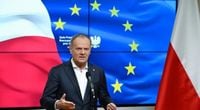In a critical meeting in Brussels, European Union leaders underscored their resolve to ensure that the EU is fully capable of defending itself against potential Russian aggression by 2030. This milestone agreement, announced on March 21, 2025, by Poland's Prime Minister Donald Tusk, reflects a significant shift in defense strategy, driven largely by the changing security landscape and increasing concerns about the United States' commitment to European defense.
The urgency for a stronger European defense stems from the perception that the U.S. is repositioning its focus toward the Indo-Pacific, thus questioning its role as the primary guarantor of European security since the end of World War II. Prime Minister Tusk articulated this sentiment, stating, "Europe can no longer remain defenseless. It is now clear to everyone that Europe must take on more responsibility and defense tasks. We in Poland have known this for a long time," as reported by IAR/PAP.
Despite the agreement, not all EU member nations are equally prepared to ramp up their defense budgets. Many countries, particularly those situated further away from direct threats, have been reticent to commit to increased spending. According to Tusk, "Behind the scenes... it stirred some emotions. Especially in countries that spend little on defense now. There are several large countries that still spend very little. And they don’t want to spend more. For now," he noted during a press conference.
Current defense spending varies widely among EU nations. For instance, Spain allocated only 1.28% of its GDP to defense in 2024, while Italy spent 1.49%, both significantly below the NATO target of 2%. However, both nations have plans to increase their military budgets, with Italy aiming for 1.6% by 2027 and Spain projecting to reach the 2% target by 2029. Other countries like Slovenia, Belgium, and Portugal are also lagging, spending between 1.29% and 1.55% of their GDP.
The urgency of this ramp-up of defense spending is intricately tied to NATO analysis suggesting that Europe has until 2030 to bolster its military capabilities before Russia could potentially rebuild its offensive strength, following the setbacks it has encountered in Ukraine. Tusk emphasized this point, stating, "Our position, shared with Denmark and Sweden, was that the more Russia has the advantage today, the more we have to hurry," thus reinforcing the collaborative nature of these defense efforts.
Additionally, the summit addressed the Eastern Shield, a newly established permanent EU defense objective aimed at enhancing security along the bloc's eastern front. Tusk confirmed this initiative's inclusion in the EU's strategy after acknowledging the difficult negotiations involved, stating, "The stronger and better-armed Europe becomes, the safer Poland will be." This reflects a broadening awareness of collective defense responsibilities across the continent.
As discussions advanced, the summit highlighted a lack of consensus regarding further military assistance for Ukraine, complicating the EU's unified approach to the ongoing conflict. Notably, Hungary raised objections that stalled concrete commitments, despite pleas from Ukrainian President Volodymyr Zelensky for additional support amounting to at least €5 billion to help bolster ammunition supplies. While leaders reiterated their continuity of support for Ukraine, no new funding was confirmed during the meeting, illustrating the challenges of reconciling diverse national priorities and interests.
In a recent statement, Tusk noted that due to Ukraine's ongoing military resistance, the country has effectively bought "invaluable time" for Poland and the rest of Europe in countering Russian maneuvers. This perspective aligns with the EU's broader analysis, which recognizes that the conflict in Ukraine is pivotal in shaping both its immediate defense needs and future strategy.
The White Paper for European defense, presented to leaders during the summit, outlines a new approach and identifies investment needs that correlate with the EU's ambitious goal of enhancing its military capabilities by 2030. Tusk summarized the prevailing sentiment well: "By 2030 Europe must be, in terms of army, weapons, technology, clearly stronger than Russia. And it will be," emphasizing a united front against external threats.
Ultimately, as EU leaders move forward, the aim is clear: Europe must demonstrate not just its readiness to defend, but also to deter potential aggression through collective action and strategic investment in its own defense capabilities. As Prime Minister Tusk succinctly stated, "It is key that Europe be really capable to defend itself and deter Putin." This commitment to defense is not just about preparing for conflict, but rather demonstrating resolve through tangible actions as Europe strives to unify and strengthen its defenses across the continent.






